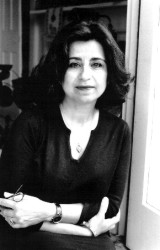| Interview
The Map of Love
Ahmede Hussain
Ahdaf Soueif is the author of the bestselling The Map of Love which was shortlisted for the Booker Prize for Fiction in 1999 ( The Map of Love, London.) A collection of her essays, Mezzaterra: Fragments from the Common Ground, was published in 2004. Her translation (from Arabic into English) of Mourid Barghouti's I Saw Ramallah also came out in 2004. She lives with her children in London and Cairo. She lives with her children in London and Cairo. Her books include 1983: Aisha, (short stories), Jonathan Cape: London (reissued by Bloomsbury in 2000); In the Eye of the Sun, (a novel), Bloomsbury: London (1992); Sandpiper, (short stories), Bloomsbury: London (1996: Sandpiper, (short stories), Bloomsbury: London (1996); Zinat al-Hayh wa Qisas Ukhra, (short stories), Dar al-Hilal, Cairo (1996); The Map of Love, (a novel), Bloomsbury, London (1999); Mezzaterra: Fragments from the Common Ground, (Essays), Bloomsbury: London (2004);
VS Naipaul has talked about separation of the man (the person who writes) and the writer. How is it like for you?
You are always trying to write away from yourself. As a novelist your job is to create characters, situations, stories. They cannot always be you. So I guess you are always trying to liberate your imagination from your self. But to rpoduce authentic work that reaches the heart of your reader you are also, in a sense, true to yourself. That's the balance, I suppose, that every artist tries to hold maintain.
 Ahdaf Soueif PHOTO CREDIT: Eamon McCabe. Ahdaf Soueif PHOTO CREDIT: Eamon McCabe.
|
Does a female writer's way of handling a certain theme differ from the way a male writer will tackle it?
Well, my father told me once that my description of pregnancy and the relationship of the mother to the unborn child was an eye-opener for him. But I don't know other than that that gender makes a difference in the way you handle a theme. It might perhaps make a difference in which theme you choose to handle in the first place.
What is your earliest childhood memory? How important is your childhood to you (as a writer)?
I think that my earliest memory is of standing behind my mother as she paused at a sideboard. She must have been putting the finishing touches to a dish she was about to take into the next room where there was a large group of her and my father's friends. She is wearing a long, loose, striped skirt and I am holding the skirt and putting my face into its folds and sucking my thumb. I have just been told by my father that I should stop sucking my thumb. I am probably three years old.
But there are many photographs of me as a child. And I've been told many, many stories about me as a child. And those stories and photographs are now part of my 'memories' as well.
My childhood is tremendously important to me. Partly because I continue to mine it in my work. Partly because I'm very aware of the huge role it played in forming me and in forming me as a writer.
Do you think every novelist, in a way, writes history, both at a personal and social level?
Probably, yes. Certainly the novelists I like most are those whose novels are very much embedded in the history of their periods or the periods they choose to write about. Think of Tolstoy.
How important is it for you to know your audience/reader?
It's not important during the act of writing. But the readers' response becomes very important in collecting energy to carry on and write the next book.
The world it seems is becoming a more dangerous place to live in...
Yes, that's true. In fact everywhere you look, from the state of the planet, to the reach of weapons and the dominance of the arms trade, to the spread of conflicts and the widening gap between rich and poor, to the tendency of the state to privilege 'security' over services, to the polarization of people behind ethnic and 'faith' barricades it looks perilous. However, I believe it is also true that there is a high level of awareness of these conditions and that more and more people are attempting to take action against them. I have a strong sense of a global grass-roots community working for a healthier and more just and equitable world. So, there is still reason to live, and to work ….
Copyright (R) thedailystar.net 2008 |
